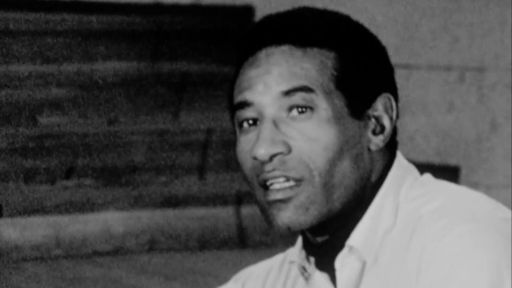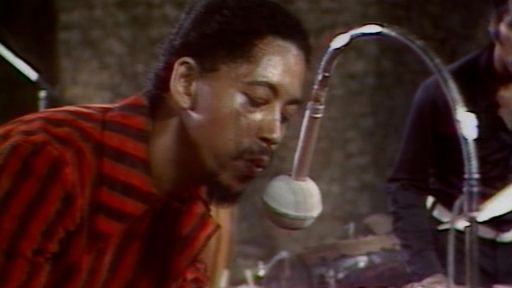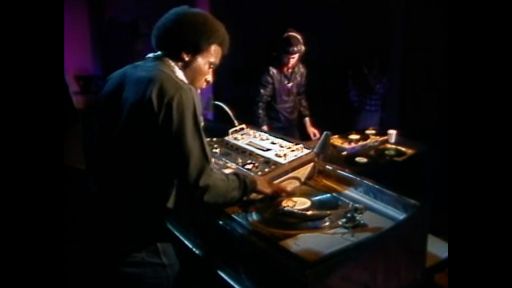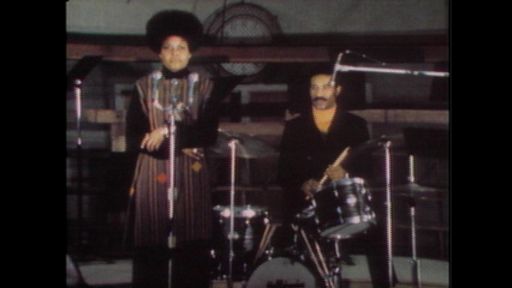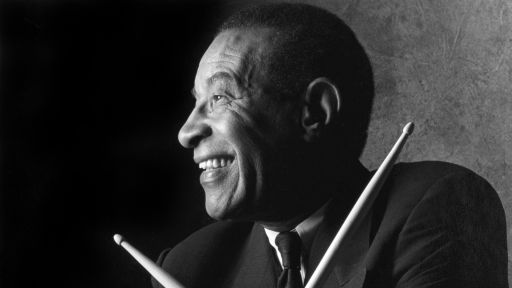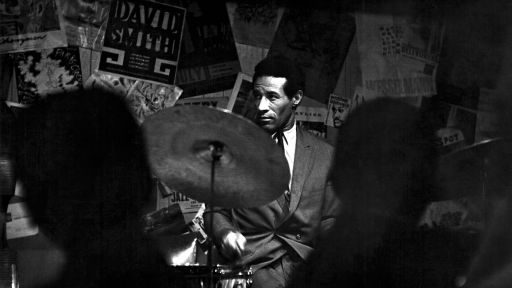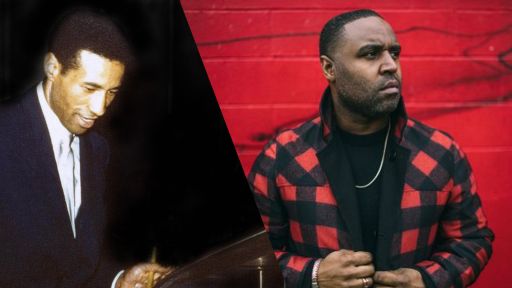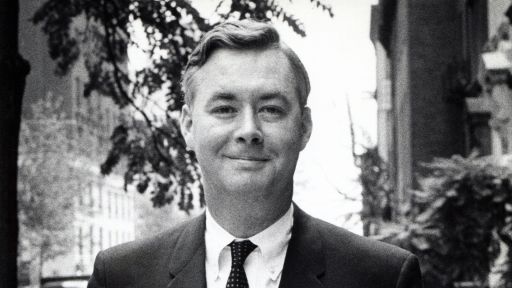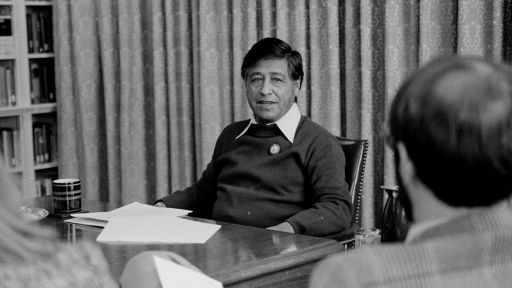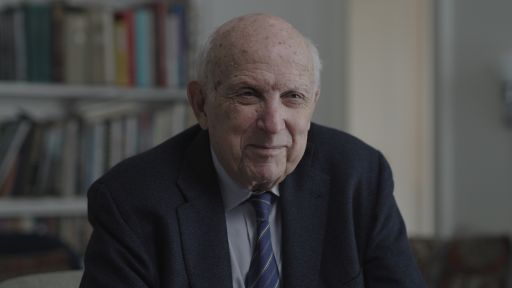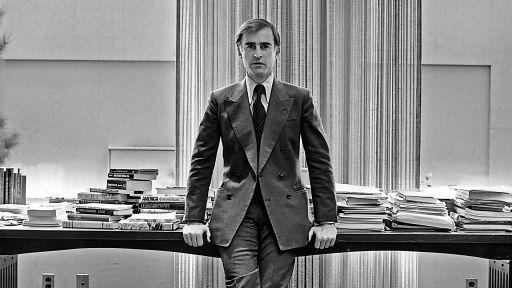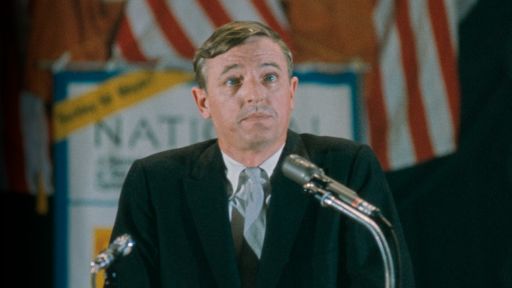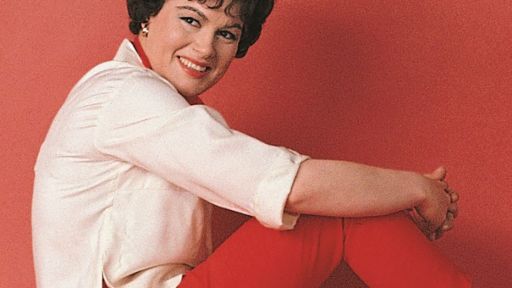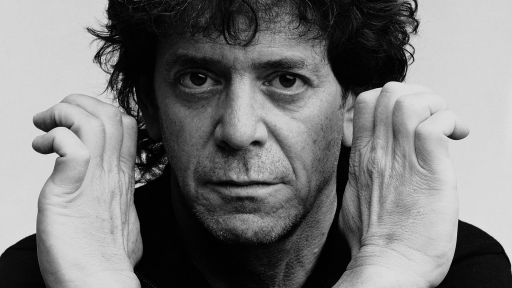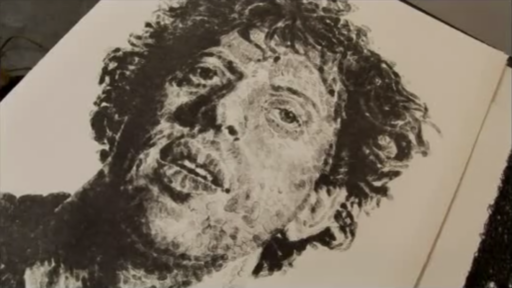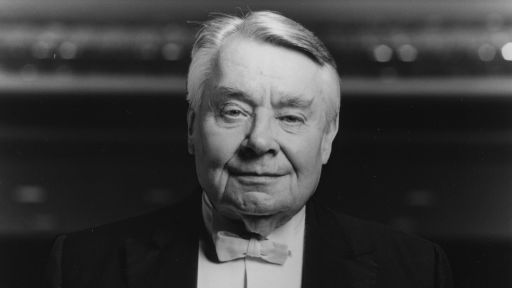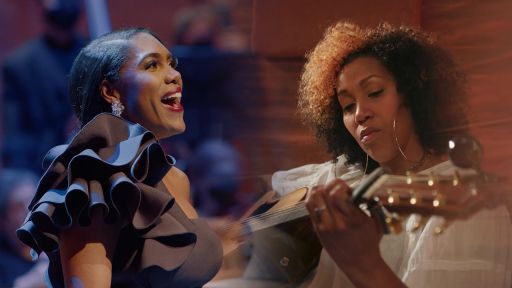TRANSCRIPT
- Among dozens of Black entertainers involved in the New Art campaign were drummer Max Roach and his wife Abbey Lincoln.
There are a few musicians who do not acknowledge Max's genius.
His impact on African American instrumental music is outstanding.
A beautiful couple, Max Roach and Abbey Lincoln.
(crowd cheering and applauding) - Ladies and gentlemen, on behalf of Abbey Lincoln and the band, and your wonderful choir and our very fine conductor, thank you very much for bringing us down here in Norfolk, and we're all looking forward to seeing all of you soon, very soon in the near future.
Bye bye and peace and power.
(mellow jazz music) We were invited to Norfolk, Virginia, to kick off the Norfolk State College 1970 concert series.
We spent three days here rehearsing in the new gymnasium with the 40-Voice Norfolk State College Choir.
A fine group of students, all of whom are Music majors, and who had no trouble grasping the nature of the music.
(students chatting) This beautiful young lady is very special to me.
She's my wife, Abbey Lincoln, the voice of our group.
(students laughing) I'm the drummer.
My name is Max Roach.
(gentle jazz music) Our pianist, George Cables.
Our very talented student director, Carl Haywood.
Our trumpet, Woody Shaw.
Our bassist, Reggie Workman.
Gary Boss is our saxophonist.
♪ Ain't there just one good thing to do ♪ The fusing of Black artists of varied backgrounds posed no problems.
We worked hard in the short amount of time we had to develop and learn as much from each other as possible before the concert.
♪ Ain't you got no sweet love in you ♪ (audience applauding) Well, Abbey, besides being one of the world's most beautiful women, is an exceptionally talented human being.
Of course, she's not only a fine singer, but she's a poet, and a playwright, and we all know she's an actress, you see.
She has helped me a great deal to write more and to engage myself in the theater on a musical level, you see.
♪ Ain't you go no sweet love in you ♪ ♪ My, how you carry on ♪ ♪ Ohhhhh-Ohhhh-Ohhhhhhhh ♪ ♪ Ain't there just one good thing to do ♪ - Since I am a singer, I try to sing about life in such a way that makes people feel good.
When I mean good, I mean a healthy kind of feeling, a positive kind of thing.
So, I really am interested in singing about those kind of things.
For instance, I write love songs, from woman to man.
I sing about the beautiful man, 'cause it makes me feel beautiful.
I don't wanna go on stage and tell people that my man is a drag 'cause they might think that I am, you know?
And I'm not.
So, he couldn't be.
You know, we are one another.
We are each other.
Strange, but having met Max seemed to point up things for me.
I had a chance to find out what made me tick.
♪ Ain't you go no sweet love in you ♪ ♪ My, how you carry on ♪ ♪ My, how you carry on ♪ ♪ My ♪ ♪ How you do ♪ ♪ You do carry on ♪ Max has always been a man of great awareness.
It's like knowing something about the geography of where you are.
The emotional geography and the social geography of place.
- Well, jazz is, to me, a nickname.
To me, it's synonymous to 'nigger' and things like that.
That's not the proper name for African American instrumental music.
And it's just cut and dry like that.
It never was a name that we as musicians gave to it.
It was a name that just was given to it.
- [Filmmaker] So you're not a jazz musician?
- No, I'm an African American musician and that's the kind of music that I play.
Or I attempt to play.
All the technique that I acquire, I try to apply it in the tradition of the people in the African American instrumental tradition.
(Max drumming steadily) Beyond my instrument, I guess I'd say people like Chick Webb and Sidney Catlett, Joe Jones, who was Count Basie Joe, and people like that.
They were my earlier influences and all up today where it's inspiring now for me to listen to people like Art Blakey and Elvin Jones and Tony Williams, and people of that caliber who are making a great contribution to the art of Afro-American instrumental percussion playing.
But as far as my writing music and becoming involved in that area, Charlie Parker, Bud Powell, Thelonious Monk.
I had a lot of people who were very generous and who helped to explain things to me about the art of writing music in the Black idiom.
- Who has been my greatest influence as far as the arts are concerned?
I think I would have to start first with where I came from, from my family.
The approach, for instance, that my mother used towards life, because she was an artist as far as being a wife and a mother are concerned.
I didn't know I was going on the stage at this time but I became fascinated with Billie Holiday at a very young age.
I was always greatly impressed with the woman Lena Horne and Sarah Vaughn, Ella Fitzgerald.
I listened to all of the great singers very closely.
And then later on I became aware of people such as Bessie Smith and Mahalia Jackson.
And when I met Max, I learned something about the music as regards the way men approach it.
- Listen, let's take George.
- [George] I was looking for the window.
Similar to what you did.
- Yeah.
Listen, Reggie, what are you playing on the change to go to the major?
Are you using E to A to F to tune?
What are you using, E minor to A minor?
- [Reggie] E minor, A minor.
- Yeah, E minor, A minor, it's the natural one.
E minor, A minor to F. Three, six, four, five.
You wanna take the last one?
Alright, this is "They Laid Him in the Tomb."
- Alright, I will.
- Alright.
Two.
Three.
Four.
♪ Were you there ♪ ♪ When they laid him ♪ ♪ In the tomb?
♪ ♪ Were you there ♪ ♪ When they laid him ♪ ♪ In the tomb?
♪ ♪ Ohhhhh ♪ ♪ Sometimes ♪ - All of these singers, all of these women, showed a direction to go into.
Bessie Smith and Billie Holiday, for instance, let me know that a singer can write.
These women were like secretaries who recorded the lives of our people.
If you listen to the songs that Bessie Smith sang, for instance.
She has a song called "Black Mountain Blues" that she wrote, that says, "Up on Black Mountain a child will smack your face.
Babies crying for liquor and all the birds sing bass."
♪ When they laid him in the tomb ♪ ♪ And were you there when they rolled away the stone?
♪ ♪ Were you there when they rolled away the stone?
♪ ♪ Ohhh ♪ ♪ Ohhh ♪ ♪ Ohhhhhh ♪ ♪ Sometimes ♪ Well, the Creator made us all unique.
Everybody has personality.
And people of African heritage have a certain way of doing things that is unapproachable by anybody else.
Everybody's doing the same thing in another way, I guess.
But we have a personality that has always been with us and that will always be with us.
We are ourselves, and you can hear it in the music.
We feel it in the music.
- What we have been doing, now I've become interested in writing musicals.
It's like a magnet, you know, I'm drawn to doing things musically that are involved with total production and with the "plight", quote-unquote, of African American instrumental music.
The African American instrumentalists whom we know of are some of the greatest composers that live today.
And so I think one way of projecting this talent, this unique and original talent, is gonna be for the musicians to come into the theater and be involved musically in the theater.
And I should say, a part of this is, the artist has an obligation to himself and he has an obligation to the times that he lives in.
He should let people know what they are about, at least to help point a way for them, if that be at all possible.
♪ There's a land of milk and honey ♪ ♪ On the river they call the Nile ♪ ♪ And every day is bright and sunny ♪ - [Abbey] I started writing lyrics to compositions, to Max's compositions at first.
And then I wrote something maybe to a Thelonious Monk piece, something to John Coltrane's music.
Well, for one thing, it's very therapeutic.
The more you write about yourself, the more you're able to understand.
♪ Yes, beautiful, wonderful Africa ♪ ♪ Some day I'm coming ♪ ♪ I'm coming for to see the promised land ♪ ♪ With days of sunshine ♪ ♪ And nights of heavenly starlight ♪ ♪ It's a paradise of sea and sky and sand ♪ ♪ And they've got those talking drums ♪ ♪ That tell them love and some laughter ♪ ♪ That tell them of a new and a brighter day ♪ - I would think that one of the... That an important step for the Black artists to take, and it appears that some of us are beginning to take this step, is to engage ourselves in ownership of not only artistic properties but physical properties.
We're gonna have to become not only the producers, which we've done so many years and been doing so long, but we are all going to have to supply the theaters, the clubs, the record companies, if you will.
We're gonna have to also assume the responsibility of ownership.
Some of it can be done maybe through a cooperative effort of people in the theater, musicians, actors, people who are writers.
In order for us to survive and also so that we can do exactly what we want to do in the arts.
You know, sometimes what happens, we disregard the ones.
So you're gonna have to keep a definite one in your mind because occasionally we do disregard one.
We go over the bar line with an accent.
So our one may sound like it's on the second or third or fourth beat.
So, what you're doing, you'll just have to just say bang according to tempo.
Let's go from a (scat singing) one, bang.
- It is with great pleasure that I present to you Mr. Max Roach.
(audience applauding) - Thank you.
Thank you.
Thank you very much.
I just wanna, before we start the program, to just explain that first piece.
It says "Triptych: Prayer, Protest, and Peace."
It's an excerpt from our Freedom Now suite, and this is a duet featuring Abbey Lincoln The Voice and yours truly drums.
Abbey.
(audience applauding) It's a piece that we hope expresses itself and gives some idea of our social involvement at this point in our career.
(Max drumming lightly) (Abbey vocalizing soulfully) It's improvisation in one of its most pure forms.
A dramatic attitude rather than any set key or scale because it was composed as a dramatic piece as well as a musical piece.
(Max drumming intensely) (Abbey vocalizing harshly) (audience applauding) (Max drumming lightly) (Abbey vocalizing mournfully) The prayer is a prayer of preparation.
The protest is a total commitment of self.
The peace is the pause before we start the cycle again.
(audience applauding) Thank you very much for bringing us down here in Norfolk, and we're all looking forward to seeing all of you soon, very soon in the near future.
Bye bye and peace and power.
(audience cheering and applauding) (Max drumming intensely) (Abbey vocalizing harshly) (Max drumming lightly) (Abbey vocalizing mournfully)

